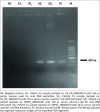Molecular confirmation of Lassa fever imported into Ghana
- PMID: 28879105
- PMCID: PMC5436394
- DOI: 10.4102/ajlm.v5i1.288
Molecular confirmation of Lassa fever imported into Ghana
Abstract
Background: Recent reports have shown an expansion of Lassa virus from the area where it was first isolated in Nigeria to other areas of West Africa. Two Ghanaian soldiers on a United Nations peacekeeping mission in Liberia were taken ill with viral haemorrhagic fever syndrome following the death of a sick colleague and were referred to a military hospital in Accra, Ghana, in May 2013. Blood samples from the soldiers and five asymptomatic close contacts were subjected to laboratory investigations.
Objective: We report the results of these investigations to highlight the importance of molecular diagnostic applications and the need for heightened awareness about Lassa fever in West Africa.
Methods: We used molecular assays on sera from the two patients to identify the causative organism. Upon detection of positive signals for Lassa virus ribonucleic material by two different polymerase chain reaction assays, sequencing and phylogenetic analyses were performed.
Results: The presence of Lassa virus in the soldiers' blood samples was shown by L-gene segment homology to be the Macenta and las803792 strains previously isolated in Liberia, with close relationships then confirmed by phylogenetic tree construction. The five asymptomatic close contacts were negative for Lassa virus.
Conclusions: The Lassa virus strains identified in the two Ghanaian soldiers had molecular epidemiological links to strains from Liberia. Lassa virus was probably responsible for the outbreak of viral haemorrhagic fever in the military camp. These data confirm Lassa fever endemicity in West Africa.
Conflict of interest statement
The authors declare that they have no financial or personal relationship(s) that may have inappropriately influenced them in writing this article.
Figures



References
-
- Günther S, Lenz O. Lassa virus. Crit Rev Clin Lab Sci. 2004; 41(4):339–390. http://dx.doi.org/10.1080/10408360490497456 - DOI - PubMed
-
- McCormick JB. Epidemiology and control of Lassa fever. Curr Top Microbiol Immunol. 1987;134:69–78. http://dx.doi.org/10.1007/978-3-642-71726-0_3 - DOI - PubMed
-
- Sogoba N, Feldmann H, Safronetz D. Lassa fever in West Africa: evidence for an expanded region of endemicity. Zoonoses Public Health. 2012;59(Suppl 2):43–47. http://dx.doi.org/10.1111/j.1863-2378.2012.01469.x - DOI - PubMed
-
- Unit for Surveillance and Communication, Unit for Preparedness and Response, Editorial team Case of Lassa fever imported into Germany from Sierra Leone. Euro Surveill. 24 July 2006;11(30):pii=3008. - PubMed
Grants and funding
LinkOut - more resources
Full Text Sources
Other Literature Sources
